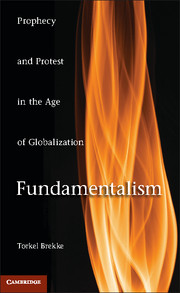Book contents
1 - Religion and Modernity in the West
from Part I - The Historical and Ideological Context of Fundamentalism
Published online by Cambridge University Press: 05 June 2012
Summary
A standard account of history, found in different versions in many books, sees modernity as a powerful force that undermines tradition and religion, and fundamentalism is commonly explained as a reaction against this force. In this type of account, fundamentalism is the struggle of religious groups and individuals to halt and reverse what is seen as the negative side of modernity. This account of fundamentalism is not incorrect, but because both modernity and religion are so many different things, we have to specify exactly what aspects of modernity and religion we are talking about if this explanation is to have any relevance and precision. That will be the aim of this chapter.
Fundamentalism is a relatively recent thing, as I insisted in the introductory chapter. It is probably meaningless to talk about fundamentalism until about 1850. What is so special about modern times? Let us for a minute think of the difference between cyclical changes and linear changes. By cyclical changes I mean transformations in religious organizations and ideologies that may occur again and again over centuries and even millennia. They are changes that take place within a structure so that the structure itself is not basically changed. Cyclical religious reform movements have always been around. We can identify any number of such reform movements in the history of Islam, Christianity, and Buddhism. Typically, when the legitimacy of an established organization and its elites crumbles, new leaders, sometimes called prophets, come along and lead a religious reform that results in a reshuffling of power and authority.
- Type
- Chapter
- Information
- FundamentalismProphecy and Protest in an Age of Globalization, pp. 17 - 38Publisher: Cambridge University PressPrint publication year: 2011



